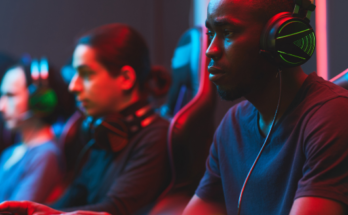In the vast landscape of virtual worlds, where pixels and avatars reign supreme, lies a thriving ecosystem of gaming communities. These communities, often formed around specific games or genres, are more than just clusters of players. They represent complex networks of individuals bonded by shared interests, experiences, and emotions. Delving into the psychology of gaming communities unveils a fascinating tapestry of human behavior, social dynamics, and the profound impact of digital interactions on our lives.
The Social Fabric of Gaming Communities
At the heart of gaming communities lies the fundamental human need for social connection. As social beings, we seek validation, support, and companionship, even in the digital realm. Gaming communities provide a platform for individuals to forge meaningful relationships, collaborate on common goals, and experience a sense of belonging. Whether it’s conquering dungeons together, strategizing in competitive matches, or simply sharing anecdotes and memes, these interactions foster a sense of camaraderie and solidarity among members.
Identity Formation and Self-Expression
Gaming communities serve as fertile ground for identity exploration and self-expression. Within these spaces, individuals can adopt personas, aliases, and avatars that reflect their idealized selves or desired identities. Freed from the constraints of physical appearance or societal expectations, players can experiment with different aspects of their personality, values, and beliefs. This process of identity play allows for greater self-discovery and empowerment, as individuals navigate the virtual landscape on their terms.
The Power of Inclusion and Exclusion
In every gaming community, there exists a delicate balance between inclusion and exclusion. While these communities strive to foster a sense of belonging for all members, they also create boundaries that define who belongs and who does not. In-group dynamics, such as cliques and hierarchies, can emerge, leading to the formation of insider-outsider dynamics. Those who conform to community norms and values are rewarded with acceptance and status, while those who deviate may face ostracism or marginalization. Understanding these dynamics is crucial for promoting inclusivity and combating toxic behaviors within gaming communities.
The Influence of Leadership and Moderation
Leadership plays a pivotal role in shaping the culture and direction of gaming communities. Whether it’s moderators, guild leaders, or influential content creators, these individuals wield significant influence over community dynamics and norms. Effective leadership fosters a positive and supportive environment, where members feel heard, valued, and empowered. Conversely, poor leadership can lead to conflict, division, and the erosion of trust within the community. By promoting transparency, accountability, and empathy, leaders can cultivate thriving gaming communities that enrich the lives of their members.
Escapism vs. Engagement: Coping Mechanisms in Gaming Communities
For many individuals, gaming communities offer a form of escapism from the stressors and challenges of everyday life. Immersed in fantastical worlds and epic quests, players can temporarily suspend reality and immerse themselves in alternate realities. This escapism provides much-needed relief and relaxation, allowing individuals to recharge and rejuvenate their minds. However, gaming communities also offer opportunities for meaningful engagement and personal growth. Whether it’s developing problem-solving skills, fostering teamwork, or honing strategic thinking, gaming can serve as a catalyst for learning and development.
The Dark Side of Gaming Communities: Dealing with Toxicity and Addiction
Despite their many benefits, gaming communities are not immune to toxicity and addiction. From cyberbullying and harassment to excessive gaming and compulsive behaviors, these communities can harbor dark undercurrents that undermine the well-being of their members. Addressing these issues requires a multifaceted approach, including community guidelines, moderation tools, and support resources for those in need. By promoting empathy, respect, and responsible gaming habits, gaming communities can create safer and healthier environments for all participants.
Conclusion: Building Stronger Bonds in the Digital Age
In an increasingly interconnected world, gaming communities represent microcosms of human interaction, where friendships are forged, identities are shaped, and experiences are shared. By understanding the psychology behind these communities, we can harness their power to foster meaningful connections, promote inclusivity, and enrich the lives of millions of players around the globe. As we navigate the ever-evolving landscape of gaming, let us strive to build stronger bonds, cultivate empathy, and create spaces where everyone feels welcome and valued.



